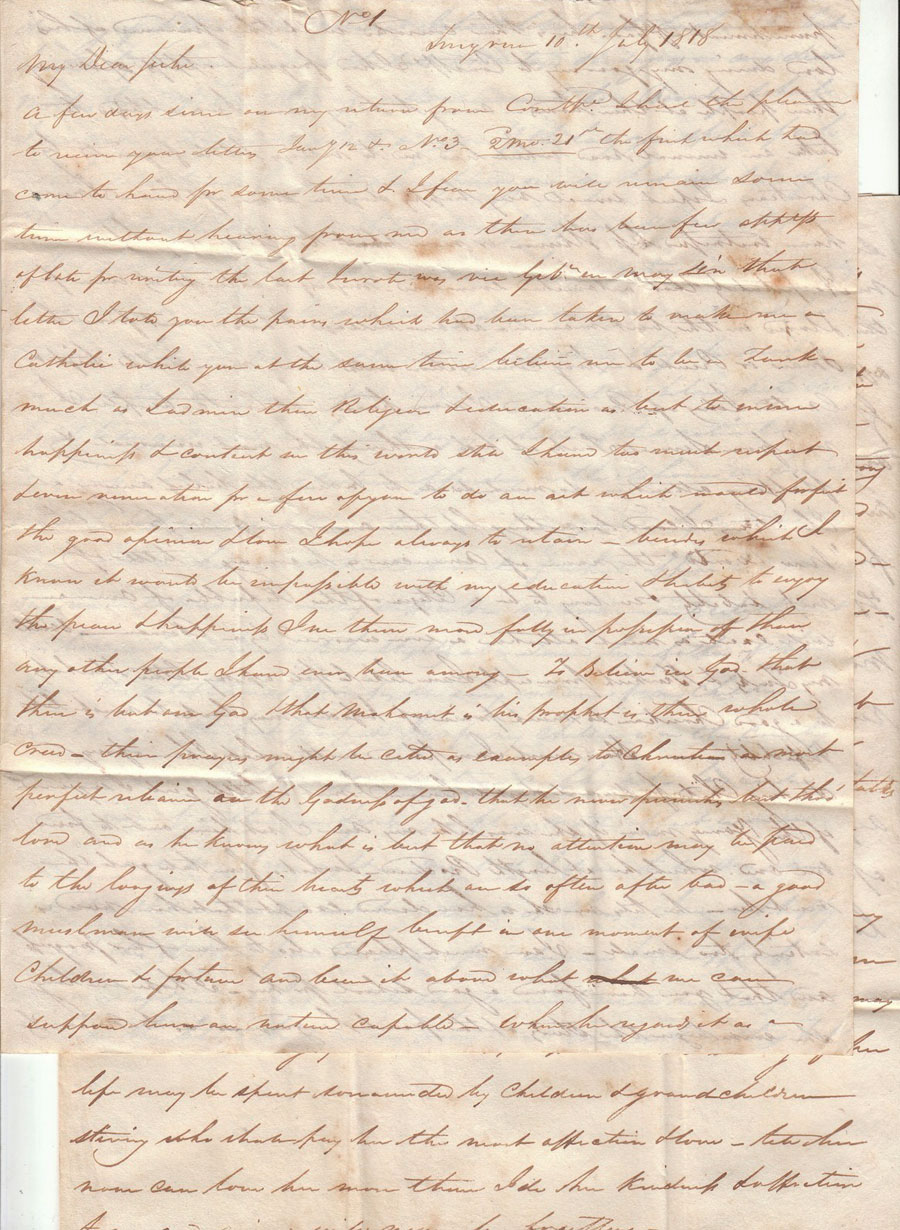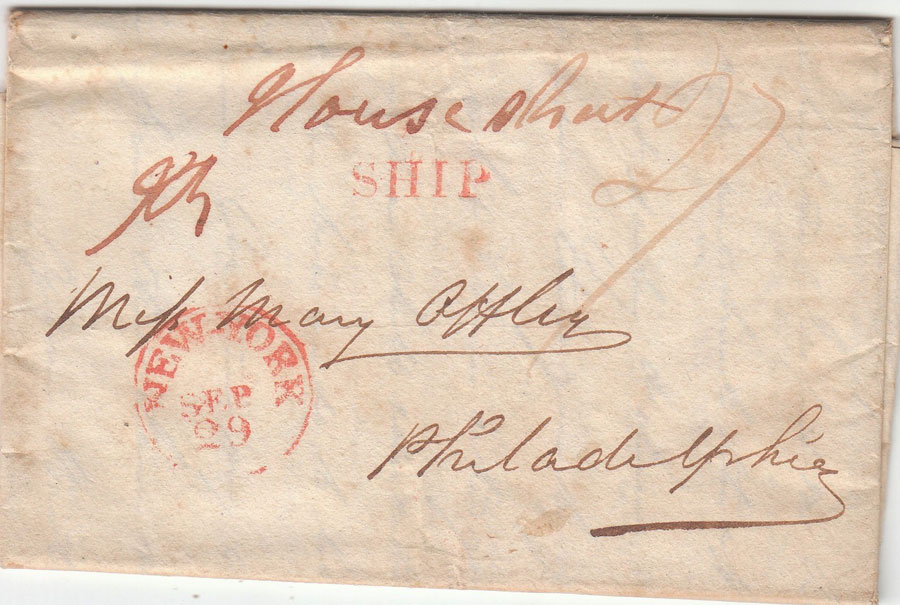Letter dated at Smyrna, Turkey, July 10, 1818, from David Offley, to his sister, Miss Mary Offley, at Philadelphia, Pa.
Folded letter has red “NEW-YORK” cds, red “SHIP” handstamp, and manuscript “27” rate. The NYC postmark is dated Sept. 29, indicating that the letter took over two and a half months to reach the U.S. There are 2 manuscript notations on the face of the cover, which read “House shut” & the initials “JR”, which are likely made by a postal employee, referring to the Offley house being shut (which they did in the summer & through Sept. during the Yellow Fever season in Philadelphia, spending those months in the country, which was considered safer than the City).
The writer of this letter, David Offley, (1779-1838), was born in Philadelphia; He served as 1st Lieutenant in the 10th U.S. Infantry, at Carlisle Barracks, Pa., 1798-1800; Established the first American commercial firm in Turkey, at Smyrna in 1811, and was the chief U.S. merchant in Turkey; U.S. Commercial Agent to Turkey; Negotiated the first U.S.-Turkey commercial treaty in 1830, and in 1832, was appointed by President Andrew Jackson, 1st U.S. Consul at Smyrna.
The College of William & Mary, in Williamsburg, Virginia, holds a collection of Offley family papers from 1826-1916, though little is of David Offley himself, and the collection starts eight years after this letter. In the span from 1811, when Offley arrived in Turkey, to 1820, approximately eighty American ships stopped at Smyrna, selling cotton goods, tobacco, gunpowder, bread-stuffs and rum. In return, American merchants picked up such Turkish exports as nuts, silver, raw wool, and hides, and participated more and more in the opium trade between the Near East and China. After 1815 the U.S. government sought to assist commerce through a naval squadron in the Mediterranean, based at Minorca. During the 1820s Henry Clay of Kentucky, who favoured the Greek drive for independence from the Ottoman Empire, spoke vehemently in the House of Representatives against pro-Turkish attitude of commercial leaders in the U.S.. During the Greek war, American opinion was divided. President James Moore in 1823 came close to recognition of Greek independence. But on American soil, the government remained aloof while commerce with the Ottoman Empire expanded. The chief merchant at Smyrna, David Offley, after 1811 led these American businessmen. Offley’s Philadelphia firm controlled about 30% of the goods exchanged there.
David Offley (1779-1838), was an invaluable and foremost contributor to American commerce in Turkey, having established the first American commercial firm, Woodmans and Offley, in Smyrna (Izmir) in 1811, then becoming chief U.S. merchant in Turkey, and U.S. Commercial Agent to Turkey from 1823 to 1832. He further negotiated the first U.S. commercial treaty with the Ottoman Empire in 1830, and in 1832, was appointed by President Andrew Jackson, first U.S. Consul at Smyrna. He remained Consul until his death in 1838. Three of his sons, Richard Jones Offley (1800-1842), John Holmes Offley (1802-1845), and David Washington Offley (1805-1846) lived with him in Constantinople, all of which are mentioned by name in this letter.
U.S. diplomatic interaction with Turkey dates back to the days when Turkey was known as the Ottoman Empire. Though trade had been ongoing for some time led by Offley's enterprise, the first formal act of diplomatic engagement and recognition between the Ottoman Empire (Turkey) and the United States occurred on February 11, 1830, when a U.S. negotiating team comprised of Captain James Biddle, David Offley, and Charles Rhind presented their credentials to the Turkish Minister of Foreign Affairs. A treaty of navigation and commerce between the two nations was successfully negotiated, and diplomatic relations were subsequently established. The relationship was maintained until U.S. entry into World War I on April 20, 1917.
He writes a lengthy discussion of his opinion of the religion of Islam, which in his opinion, Christians could learn from, and which he is somewhat tempted to convert to. This must have come as a shock to his sister, a devout Quaker (their father was a Quaker minister). He also writes of his 3 young sons (Richard, Holmes & David), who came to Turkey to live with him, and of his young daughter he left behind in the care of his mother & sister in Philadelphia. He writes of his business in Turkey, travels to Constantinople, and of the increasing notice the Turks are taking of Americans.
Includes:
“A few days since my return from Constantinople, I had the pleasure to receive your letters January 12, & No. 3, 2d mo. 21st [Feb. 21st], the first of which had come to hand for some time, & I fear you will remain some time without hearing from me, as there has been few opportunities of late for writing.
The last I wrote was...on May 4. In that letter, I told you the pains which had been taken to make me a Catholic, while you at the same time believe me to be a Turk - much as I admire their religion & education as but to ensure happiness & content[ment] in this world. Still I have too much respect & even veneration for a few of you, to do an act which would forfeit the good opinion & love I hope always to retain - besides which I know it wold be impossible with my education & habits to enjoy the peace & happiness I see them more fully in possession of than any other people I have ever been among. To believe in God, that there is but one God, & that Mohamet is his prophet, is their whole creed. Their prayers might be cited as examples to Christians as most perfect...on the Goodness of God; that he never punishes but thro’ love, and as he knows what is best, that no attention may be paid to the longings of their hearts, which are so often after bad. A good Musleman will see himself bereft in one moment of wife, children & fortune, and bear it above what we can suppose human nature capable. When he regards it as a punishment of God, he is then consoled in the assurance of his love.
During my journey to Constantinople, I had frequent opportunities of viewing these people at their homes. Owing to heavy rains, I was obliged to take an unusual road, which led me to villages little frequented by Christians. I spend several very happy days in some of them. I never have witnessed less illusion, or more truth in my life - hospitality that astonished even me - myself & attendants were fed & lodged in the best manner. At one village, I had a visit from the Iman, or Priest, & a long conversation with him. More noble, high & exalted ideas of Providence I never had. At Constantinople, I received from several Turks of high authority, the most unusual & flattering attentions; so much so, as to induce the believe among all Christians I could be nothing less than an ambassador from the ‘New World’. The name of American is becoming a title of respectability, & ere long, to be a Citizen of the Republic of America will excite as much attention as ever was received by a Roman.
With my Turks & Turkish principles, I am like to fill up my letter, & perhaps to a good Christian, so much praise of Infidels may may look too much like Infidelity.
How much I am pleased with what I hear of my darling Child....I am much pleased also to hear of her progress and that you have found a good school for her. I hope ere long she will begin the study of the French language. As to Music & dancing, if it could be so managed, I should like her to be learnt, but I would by no means give up the solid advantages she enjoys in my dear Mother’s... for even these agreeable amusements. To a Boarding school. I am no way desirous she should ever go...
Much, my beloved sister, do I wish to see you, much do I wish to enjoy a little of that rational happiness I should be so certain of finding in the old house in Front Street; but depend on it, our actions are always governed by circumstances over which we have no control, several of which appear to make my removal from this country difficult. My commercial establishment has become too valuable to be slightlyl abandoned by a father of three sons. This establishment promises an easy entrance for my children into the world. The best prospect I see for my children in in this country, and these are most desirous considerations, are they not. Lay aside for one moment, ‘enthusiasm’, & judge as a ‘plain matter of fact’ woman, and you will say I am right. Much do I desire to see America, but still that rose would not be without its thorns. I am not happy even at this distance from the scene of my disgrace & unhappiness, the view of scenes which would ever moment recall recollections to make the blood boil in my veins, would conduce to nothing but more complete misery. How well I feel, Mary, that my heart was never made to exist as it now does. When I return to a house I may call elegant, furnished with everything which certain luxury...to make life agreeable....I feel shut up from the world as if I was the only creature in it. Less of that enthusiasm of character you admire would be most desirable for me once more. Patience, patience, patience.
Richard [his son], has recovered his health, and is much more lively than ever I have known him. He is nearly as tall as I am & would pass well for a young man of 23 or 25 years. It is in contemplation for him to go shortly to Constaninople, where probably he may remain some time. We do much business in that place, & I may be able to make arrangements which will be highly advantageous to him. Holmes [another son] will come into the Counting House this year. He continues much undersize. David [another son] goes on very well - grows astonishingly, & I predict one way or another will make a figure in the world...
Well, my dear little sister, when is all these Beaux visits to finish. When do you mean to settle down into the quiety & domestic wife. Whenever you find one who you love better than Mother, Brother or Sister, do not let him escape...”
 |
 |